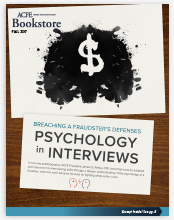Breaching a Fraudster's Defenses: Psychology in Interviews
/ACFE STAFF
Before becoming president of the ACFE, James D. Ratley, CFE, worked with the Dallas, Texas Police Department, developing many important interviewing skills along the way. While working in internal affairs, he joined a joint task force assembled to investigate possible widespread fraud at the Dallas/Fort Worth Airport (DFW).
Looking back at that time he stated, “I didn’t know anything about white-collar crime, but I had to interview people suspected of committing it.” In this excerpt from Policing Fraud: My Journey from Street Cop to Anti-Fraud Leader, Ratley describes how he adapted and improved his interviewing skills to help him investigate white-collar crime through an understanding of the psychology of a fraudster.
“To match wits with a fraudster during an admission-seeking interview, I needed clear insight into why he or she stole and often kept stealing until caught. That would help me interpret what the suspect said or didn’t say, as well as understand how to persuade him to level with me.
On occasion, I read articles on why crooks committed a variety of crimes, and now my interest was surging. So I called the University of Texas in Dallas and asked for an appointment with Dr. Larry Redlinger, a highly regarded criminologist. When we met, he explained that although he didn’t specialize in white-collar crime, he knew of two books that might help me.
'Bring this over to the UT library,' he said while scribbling the titles and his signature. 'Tell them I’d appreciate it if they let you borrow them. The more important one is Dr. Donald R. Cressey’s Other People’s Money. It explains who embezzles and why.' He added that Cressey had co-authored the second book — Principles of Criminology — with Edwin H. Sutherland. 'It’s the standard text. Sutherland coined the term white-collar crime to describe this particular type of offense.' I thanked him and hurried to get those books before someone else did. That evening I began devouring both. They would eventually change my professional life.
… Over the next several nights, I immersed myself in Dr. Cressey’s discussions of why and how people steal from their employers and others who trust them. The key factors that he said cause and permit fraud — need, opportunity, and rationalization … Together these three elements formed what Cressey called the Fraud Triangle.
Now, thanks to him, I understood what really linked white-collar criminals, their schemes, and the businesses they defrauded.
… Reading Cressey revealed to me how rationalization stimulates and perpetuates fraud. I remember thinking to myself, 'You can’t judge these people by your standards. They don’t have your standards.' And that’s how it is. White-collar criminals often don’t feel like they’ve done anything wrong. Once I understood that, I changed my entire approach, tailoring my interviews to their rationalizations.
Before reading Cressey, I would have said to a suspect I had strong evidence against, “I know you took that money, so just tell me how you did it.” But it’s hard getting someone to admit he committed a crime; sometimes I’d be at it all day and wind up with nothing to show for my efforts. My new method was to ask the suspect how he felt about his job and the company. If he expressed resentment, I’d probe for specifics. That tended to induce the suspect to vent, for example, about working long hours and not getting a raise. Then I’d shift gears, no longer trying to get him to admit doing something wrong. 'All that extra work, and they didn’t give you anything for it?' I’d say. 'How did you manage to get the money they owed you?'
When I got a suspect to answer that question honestly, I knew I’d made real progress, far more than by being confrontational or accusatory. The next step was to get a written, signed statement from the suspect, as I’d done many times for nonfinancial crimes. In fraud cases, though, there’s no point in charging someone unless you can prove intent.
Some suspects admitted committing a fraudulent act, but said it was the result of an honest error or ignorance. To counter that, I’d appeal to the suspect’s vanity, encouraging him to explain how he’d cleverly managed to conceal his fraud. I’d also ask nonconsecutive questions about the specifics of the fraud, seeking contradictions in the suspect’s account that might lead him to tell lies I could disprove by comparing them to known facts or witness testimony. In this way, even when the suspect didn’t realize it, I’d obtain ample proof of his intent to commit fraud. And that gave me a solid case for the Dallas County D.A.”
Still need some last-minute gifts for your favorite fraud fighter? Read more about this book and the many other resources available in the latest ACFE Bookstore Catalog.



